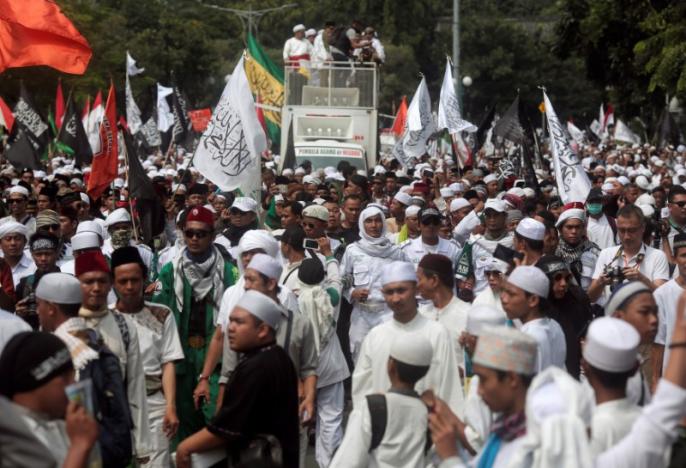Indonesia's jailing of the Christian governor of Jakarta will embolden extremists
Indonesia's highest profile Christian politician is tonight in a prison cell, sentenced to two years for blasphemy, and the country's reputation for pluralism and religious tolerance is in peril. The district court where the verdict was announced was surrounded by radical Islamist mobs calling for his hanging, shouting 'Allah-u-Ahkbar' ('God is great') – and by tearful supporters devastated at the decision.
Basuki Tjahaja Purnama, known popularly as 'Ahok', was once the poster boy for Indonesia's diversity. An ethnic Chinese and a Christian, he became Governor of Jakarta, capital of the world's largest Muslim-majority nation, when his predecessor Joko Widodo won the country's presidency. Ahok had been Widodo's deputy governor and the symbolism he gave as both an ethnic and a religious minority running the capital was widely celebrated. With a reputation for abrasive efficiency and effectiveness and for being 'clean' in an otherwise often corrupt political environment, Ahok was on course to win his own electoral mandate – until last November, when he was formally charged with blasphemy.

The case goes back to last September, when Ahok reportedly quoted a Quranic verse on the campaign trail while addressing concerns that his political opponents may use the verse to discourage people from voting for him as a non-Muslim. He was then falsely accused of criticising the verse itself. The court case against the governor was filed by several conservative Islamic groups after his statement went viral via a doctored YouTube video.
Ahok's trial began on December 13, 2016, and took a series of turns. While most Islamic organisations supported the case against him, one courageous young Muslim cleric, Ahmad Ishomuddin, appeared as an expert witness in Ahok's defence, showing that Indonesia's moderate tradition of Islam was still alive. He was subsequently dismissed from his place on the country's Ulama Council. An estimated 500,000 Muslims turned up to a number of rallies in November and December 2016 to protest against Ahok's alleged blasphemy.
In the gubernatorial race, Ahok was ahead in the first round despite the blasphemy charges. However, he lost in the final round to Indonesia's former education and culture minister, Anies Baswedan, who had courted the Muslim vote and played the religion card throughout the campaign. Anies built a coalition of support which included hardline Islamist groups such as the Islamic Defenders Front, well-known for violent attacks on Christians and other religious minorities, and former presidential candidate Prabowo Subianto, son-in-law of the former dictator Suharto and a retired general accused of serious human rights violations. Despite a reputation as a moderate Muslim himself, Anies' courting of Islamist groups casts a dark cloud on Indonesia's future. By giving Islamists a platform and a sense of victory in the election he has, perhaps unwittingly, empowered and unleashed them with potentially dangerous consequences.
The big issue arising out of today's verdict is Indonesia's blasphemy laws. Ahok will appeal against his verdict, and it is hoped that on appeal his sentence may be reduced or even overturned. But his is merely the most high-profile of a number of blasphemy cases which illustrate Indonesia's rising intolerance.
Ade Amando, a lecturer at the prestigious Universitas Indonesia, was charged in December 2016 for writing on Facebook that: 'God is not an Arab. Surely God would be happy if His scripture was read in the dialects of Minang, Ambon, China, Hip-hop, blues...' He could face up to 11 years in jail on two charges, under the blasphemy law and the Information and Electronics Transaction Act. Similarly, three leaders of a spiritual movement known as 'Gafatar' are currently on trial for blasphemy in East Jakarta District Court.
Three years ago, Christian Solidarity Worldwide published a ground-breaking new report, Indonesia: Pluralism in Peril – The rise of religious intolerance across the archipelago, which argued that the growth of extremism in Indonesia threatened the country's reputation for moderate Islam, inter-faith harmony and religious freedom. The report documents the abuse of blasphemy laws, the rise of Shari'a-inspired regulations, restrictions on places of worship and violent attacks against Christians as well as minorities within Islam such as the Ahmadiyya and Shi'a, who are regarded as heretical by the hardline Sunni extremists.
Indonesia, despite being the largest Muslim-majority nation, is not an Islamic theocracy. From its foundation, the country adopted a state ideology known as 'Pancasila', giving equal recognition to the major religions. Although 'Pancasila' has its limitations – followers of beliefs outside the six recognised beliefs of Islam, Protestantism, Catholicism, Buddhism, Hinduism and Confucianism, face discrimination while atheism is illegal – it does at least provide some space for pluralism. Now even that space is shrinking, and Indonesia's reputation as a homeland for moderate Islam is on the line.
Only courageous action can bring the country back from the brink. President Joko Widodo should order a review of the blasphemy laws and move towards their repeal. He should stand up to the Islamists, because history shows that the more extremists are appeased, the more they are emboldened.
Challenging them is risky and could bring down his government, but the alternative is that Indonesia goes the way of Pakistan, a country which knows the strife blasphemy laws cause. The question is whether President Widodo has that courage.
Benedict Rogers is East Asia team leader for Christian Solidarity Worldwide.











